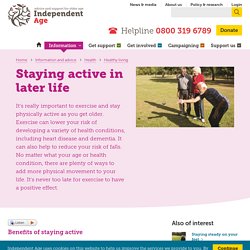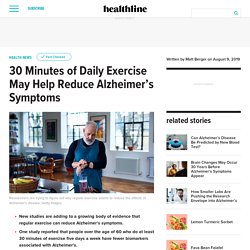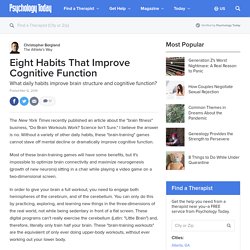

Further research has also shown that exercising could help to reduce symptoms of certain cognitive-related illnesses such as Alzheimer's disease. Staying active in later life. Benefits of staying active Physical activity can lower your risk of developing - or help you manage - many chronic health conditions, including coronary heart disease, stroke, Type 2 diabetes, some types of cancer, obesity and arthritis.

Protecting against cognitive decline. While there's currently no treatment that can prevent or cure dementia, researchers have identified some factors that may help protect you from cognitive decline.

Exercise Exercise offers an impressive array of health benefits. It helps prevent heart disease and type 2 diabetes; lowers the risk for high blood pressure, colon cancer, and breast cancer; and helps relieve insomnia, anxiety, and depression. In addition, it may help ward off cognitive decline and dementia. Plus, some studies have shown that engaging in a program of regular exercise improved cognitive function in people who already had memory problems.
A Mediterranean-style diet. Ageing Well: 5 Essential Health Tips for the Elderly. Growing older is a normal part of life and ageing will affect you physically and mentally.

As you age, it is important to keep practising healthy habits that will help reduce stress and maintain a healthy mind and body. Although you cannot control everything that affects your health, keep in mind that many things are within your hands. There are things you can do to stay healthy that cost next to nothing and can be done alone or with friends. For example, you could start an exercise group with your neighbours and engage in physical activity every morning. Ways to minimise the effects of ageing include healthy eating, staying mentally alert, intellectually curious and physically active. Senior Exercise and Fitness Tips. No matter your age, it’s never too late to get fit.

These easy tips will help you get started safely and make it fun. What are the benefits of exercise for older adults? There are many reasons why we tend to slow down and become more sedentary with age. It may be due to health problems, weight or pain issues, or worries about falling. Or perhaps you think that exercising simply isn’t for you. A recent Swedish study found that physical activity was the number one contributor to longevity, adding extra years to your life—even if you don’t start exercising until your senior years. Getting moving can help boost your energy, maintain your independence, protect your heart, and manage symptoms of illness or pain as well as your weight.
Physical health benefits Helps you maintain or lose weight. Reduces the impact of illness and chronic disease. Enhances mobility, flexibility, and balance. Mental health benefits Improves sleep. Alzheimer's Symptoms and Daily Exercise. New studies are adding to a growing body of evidence that regular exercise can reduce Alzheimer’s symptoms.One study reported that people over the age of 60 who do at least 30 minutes of exercise five days a week have fewer biomarkers associated with Alzheimer’s.A second study found that people with a genetic high risk of Alzheimer’s who exercised regularly had fewer biomarkers.A third study reported a biomarker known as “white matter hyperintensities” increased more slowly in people who are physically active.

The evidence linking exercise to a reduced risk for Alzheimer’s disease is growing. New research presented today at the American Psychological Association’s annual meeting added to the tally of small studies that have found a correlation between physical activity and fewer signs or weaker symptoms of Alzheimer’s and other forms of dementia. The question of whether the activity is the actual remedy remains open. But further, larger studies are moving forward to tackle the question. Eight Habits That Improve Cognitive Function. The New York Times recently published an article about the "brain fitness" business, "Do Brain Workouts Work?

Science Isn’t Sure. " I believe the answer is no. Without a variety of other daily habits, these "brain-training" games cannot stave off mental decline or dramatically improve cognitive function. Most of these brain-training games will have some benefits, but it's impossible to optimize brain connectivity and maximize neurogenesis (growth of new neurons) sitting in a chair while playing a video game on a two-dimensional screen. In order to give your brain a full workout, you need to engage both hemispheres of the cerebrum, and of the cerebellum.
Article continues after advertisement Although the cerebellum constitutes only 10 percent of the brain by volume, it houses over 50 percent of the brain's total neurons. Brain-Training Games Increase Sedentary Screen Time I slightly disagree. 1. 2. 3. Simple habits to help maintain cognitive abilities. Slow and Gentle Yoga. Yoga for Seniors ♥ Chair Stretches for Pain Relief, Relaxation, Joint Health, Flexibility, Stress.
Chair Yoga - Yoga For Seniors. Chair yoga. Gentle Yoga Exercises for Seniors. Yoga for Seniors with Michelle Rubin: Gentle Yoga For The Whole Body. Daily Stretches for Seniors - Simple Yoga Exercises. Yoga for Seniors with Michelle Rubin: Hips & Knees. Knees, Hips.